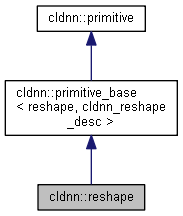Public Types |
Public Member Functions |
Static Public Member Functions |
Public Attributes |
Protected Member Functions |
List of all members
cldnn::reshape Struct Reference
Changes information about inputs's layout effectively creating new memory which share underlaying buffer but is interpreted in a different way (different shape). More...
#include <reshape.hpp>
Inheritance diagram for cldnn::reshape:

Collaboration diagram for cldnn::reshape:

Public Types | |
| typedef cldnn_reshape_desc | dto |
Public Member Functions | |
| reshape (const primitive_id &id, const primitive_id &input, const tensor &output_shape, const padding &output_padding=padding()) | |
| Constructs reshape primitive. More... | |
| reshape (const dto *dto) | |
| Constructs a copy from basic C API cldnn_reshape_desc. | |
 Public Member Functions inherited from cldnn::primitive_base< reshape, cldnn_reshape_desc > Public Member Functions inherited from cldnn::primitive_base< reshape, cldnn_reshape_desc > | |
| const cldnn_primitive_desc * | get_dto () const override |
| Returns pointer to a C API primitive descriptor casted to cldnn_primitive_desc. | |
 Public Member Functions inherited from cldnn::primitive Public Member Functions inherited from cldnn::primitive | |
| primitive (const primitive_type_id &type, const primitive_id &id, const std::vector< primitive_id > &input, const padding &output_padding=padding()) | |
| primitive (const cldnn_primitive_desc *dto) | |
| Constructs a copy from basic C API cldnn_primitive_desc. | |
| std::vector< std::reference_wrapper< primitive_id > > | dependecies () |
| Returns references to all primitive ids on which this primitive depends - inputs, weights, biases, etc. | |
| std::vector< primitive_id > | dependecies () const |
| Returns copy of all primitive ids on which this primitive depends - inputs, weights, biases, etc. | |
| operator primitive_id () const | |
| Implicit conversion to primiitive id. | |
Static Public Member Functions | |
| static primitive_type_id | type_id () |
Public Attributes | |
| tensor | output_shape |
| Requested memory shape. | |
 Public Attributes inherited from cldnn::primitive Public Attributes inherited from cldnn::primitive | |
| const primitive_type_id | type |
| Primitive's type id. | |
| const primitive_id | id |
| Primitive's id. | |
| fixed_size_vector_ref | input |
| List of ids of input primitives. | |
| padding | output_padding |
| Requested output padding. | |
Protected Member Functions | |
| void | update_dto (dto &dto) const override |
 Protected Member Functions inherited from cldnn::primitive_base< reshape, cldnn_reshape_desc > Protected Member Functions inherited from cldnn::primitive_base< reshape, cldnn_reshape_desc > | |
| primitive_base (const primitive_id &id, const std::vector< primitive_id > &input, const padding &output_padding=padding()) | |
| primitive_base (const cldnn_reshape_desc *dto) | |
 Protected Member Functions inherited from cldnn::primitive Protected Member Functions inherited from cldnn::primitive | |
| virtual std::vector< std::reference_wrapper< const primitive_id > > | get_dependencies () const |
Additional Inherited Members | |
 Protected Attributes inherited from cldnn::primitive Protected Attributes inherited from cldnn::primitive | |
| primitive_id_arr | _input |
Detailed Description
Changes information about inputs's layout effectively creating new memory which share underlaying buffer but is interpreted in a different way (different shape).
- Note
- reshape primitive is supposed only to reinterpret shape of the memory therefore it's not possible to change neither data type nor format of the input buffer and total number of elements in input and output (excluding paddings) must match.
Definition at line 35 of file reshape.hpp.
Constructor & Destructor Documentation
◆ reshape()
|
inline |
Constructs reshape primitive.
- Parameters
-
id This primitive id. input Input primitive id. output_shape Requested memory shape (excluding padding). output_padding Requested memory padding.
Definition at line 44 of file reshape.hpp.
The documentation for this struct was generated from the following file:
- C:/ML/OpenSource/clDNN/api/CPP/reshape.hpp
